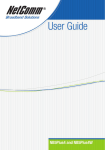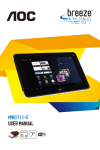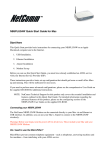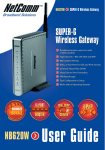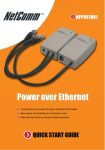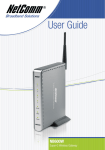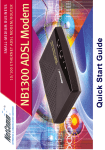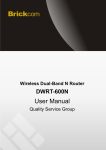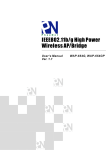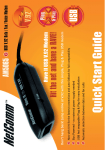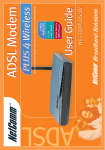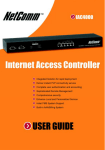Download NetComm NB5Plus4 User's Manual
Transcript
Legal & Regulatory Information This manual is copyright. Apart from any fair dealing for the purposes of private study, research, criticism or review, as permitted under the Copyright Act, no part may be reproduced, stored in a retrieval system or transmitted in any form, by any means, be it electronic, mechanical, recording or otherwise, without the prior written permission of NetComm Limited. NetComm Limited accepts no liability or responsibility, for consequences arising from the use of this product. NetComm Limited reserves the right to change the specifications and operating details of this product without notice. NetComm is a registered trademark of NetComm Limited. All other trademarks are acknowledged the property of their respective owners. Customer Information ACA (Australian Communications Authority) requires you to be aware of the following information and warnings: (1) This unit shall be connected to the Telecommunication Network through a line cord which neets the requirements of the ACA TS008 Standard. (2) This equipment has been tested and found to comply with the Standards for C-Tick and or A-Tick as set by the ACA. These standards are designed to provide reasonable protection against harmful interference in a residential installation. This equipment generates, uses, and can radiate radio noise and, if not installed and used in accordance with the instructions detailed within this manual, may cause interference to radio communications. However, there is no guarantee that interference will not occur with the installation of this product in your home or office. If this equipment does cause some degree of interference to radio or television reception, which can be determined by turning the equipment off and on, we encourage the user to try to correct the interference by one or more of the following measures: • Change the direction or relocate the receiving antenna. • Increase the separation between this equipment and the receiver. • Connect the equipment to an alternate power outlet on a different power circuit from that to which the receiver/TV is connected. • Consult an experienced radio/TV technician for help. (3) The power supply that is provided with this unit is only intented for use with this product. Do not use this power supply with any other product or do not use any other power supply that is not approved for use with this product by NetComm. Failure to do so may cause damage to this product, fire or result in personal injury. This Quick Start Guide covers both the NB5Plus4 and NB5Plus4W ADSL2+ Modem Router.Features and functions dedicated to the NB5Plus4W - Wireless model are included in the User Guide on the supplied CD-ROM separately. This Quick Start Guide assumes that you have already established an ADSL service with your Internet service provider (ISP). These instructions provide a basic configuration that should be compatible with your home or small office setup. NetComm Technical Support for this product only covers the basic installation and features outlined in this Quick Start Guide. For detailed information regarding the advanced features of this product, please refer to the configuring sections in the NB5Plus4/W User Guide on the supplied CD-ROM. NB5Plus4/W Quick Start Guide 2 YML755Rev1 www.netcomm.com.au Contents Overview .......................................................................................................................................4 NB5Plus4/W Package Contents ..............................................................................................5 Minimum System Requirements .............................................................................................6 Do I need a Micro filter? ........................................................................................................7 LED Indicators .........................................................................................................................8 Back Panel Ports .....................................................................................................................9 Restoring Factory Defaults.................................................................................................... 10 Default Settings .....................................................................................................................11 Connecting your NB5Plus4/W .................................................................................................... 12 Connecting your NB5Plus4/W ADSL Modem via ETHERNET................................................. 12 Connecting your NB5Plus4/W ADSL Modem via USB ........................................................... 13 NB5Plus4W Antenna Instructions ......................................................................................... 14 Configuring your NB5Plus4/W .................................................................................................... 15 Computer Hardware Configuration ............................................................................................ 17 Windows® XP PCs ................................................................................................................ 17 Windows 2000 PCs ............................................................................................................... 17 Windows Me PCs .................................................................................................................. 17 Windows 95, 98 PCs ............................................................................................................. 18 Appendix A: Troubleshooting ..................................................................................................... 19 The ADSL Router is not functional ........................................................................................ 19 I can’t connect to the ADSL Router........................................................................................ 19 The DSL Link LED continues to blink but does not go solid................................................... 19 The ADSL Link LED is always off............................................................................................20 Appendix B: ADSL Router terms.................................................................................................. 21 What is a firewall?................................................................................................................. 21 What is NAT? ......................................................................................................................... 21 What is a DMZ? ..................................................................................................................... 21 What is a Gateway? ...............................................................................................................22 Appendix C: Cable Connections ..................................................................................................23 RJ-45 Network Ports .............................................................................................................23 Straight and crossover cable configuration .........................................................................24 RJ11 connector and cable ......................................................................................................25 605 to RJ-11 adapter ..............................................................................................................25 USB cable .............................................................................................................................25 Appendix D: Registering your NetComm Product .......................................................................26 Contact Information ..............................................................................................................26 Legal & Regulatory Information ............................................................................................26 Customer Information ...........................................................................................................26 Product Warranty ..................................................................................................................27 Limitations of Warranty ........................................................................................................27 YML755 Rev1 www.netcomm.com.au NB5Plus4/W Quick Start Guide 3 Overview Thank you for purchasing the NetComm NB5Plus4/W ADSL/ADSL2 Modem Router. NetComm brings you the Next Generation of ADSL technology with ADSL-2*, which boosts ADSL’s performance, improves interoperability, and supports new applications, services and deployment conditions. NetComm’s implementation of ADSL-2* and ADSL-2+* ensures that the NB5Plus4/W operates with existing ADSL services while delivering optimal performance in all modes of operation. Powered by the latest ADSL-2* TI chipset, NetComm’s NB5Plus4/W increases downstream data rates by up to 50% (12Mbps) and 100% (25Mbps) for ADSL2 Plus* mode ensuring that you can surf the net or download your files quicker than ever before. Security is a key issue with Broadband users and NetComm’s NB5Plus4/W does not leave you exposed. Employing the latest Active Firewall technology, the NB5Plus4/W checks every packet of data that comes in ensuring your defences are rock-solid against hackers, unauthorised entries, probes and even Denial of Service attacks. What’s more, the NB5Plus4/W is equipped with a VPN pass-through feature allowing you to use a standard VPN client for Point-to-Point communication even while your Firewall is active. The NB5Plus4/W delivers the connection versatility needed to cater for today’s ADSL users. You can simply attach the NB5Plus4/W to a single PC by using the USB port or Ethernet port. Alternatively, should you wish to share your Internet connection, the NB5Plus4/W is equipped with an in-built Router and four 10/100 Ethernet ports for connection to a network. If you have the NB5Plus4W modem, you can share your Internet connection wirelessly. The NB5Plus4/W’s Port Forwarding and UPnP functions have made it easier for today’s Internet users to configure and setup the myriad of Network Port Rules needed by Internet applications such as On-Line Gaming, Peer-To-Peer file sharing and Messenger services to operate. NB5Plus4/W has a number of pre-configured rules for several games, just click on the game you wish to play on-line and the rest is done for you. Added to this, the NB5Plus4/W introduces a QoS (Quality of Service) feature that gives you control over which types of outgoing data are given priority by the router. With QoS you can tailor your router settings to ensure that you can keep gaming or browsing even though your upstream bandwidth may be saturated by applications such as Peer-To-Peer file sharing. * Your ISP must support and provide you with an ADSL-2 or ADSL-2+ service for these features to be available. This product will operate as a standard ADSL Modem Router when an ADSL-2 service is not available. This reference manual assumes that the reader has an installed Ethernet card in the computer to be connected and has basic to intermediate computer and Internet skills. However, basic Computer Networking, Internet, and Firewall technology information is available from the NetComm Web site. See www.netcomm.com.au. NB5Plus4/W Quick Start Guide 4 YML755Rev1 www.netcomm.com.au NB5Plus4/W Package Contents Your NB5Plus4/W Package contains the following items: • • • The NB5Plus4 or NB5Plus4/W Modem Router (both models shown above) • Telephone Cable (RJ-11) • RJ11 to 605 Adaptor • USB Cable • CAT-5 UTP Straight Ethernet Network Cable (RJ-45) • Power Adaptor (AC 15V) Driver and Manual CD NB5Plus4/W Quick Start Guide and Package Contents Note If any of the above items are damaged or missing, please contact your dealer immediately. YML755 Rev1 www.netcomm.com.au NB5Plus4/W Quick Start Guide 5 Minimum System Requirements Before continuing with the installation of your NB5Plus4/W, please confirm that you comply with the minimum system requirements. • Pentium® MMX 233MHz • A CD-ROM Drive • Ethernet card installed with TCP/IP Protocol (required only if you are connecting to the ETHERNET port of your ADSL Router) • USB Port (required only if you are connecting to the USB Port of your ADSL Router) • Host Operating Systems support for USB: • Windows® 98 Second Edition • Windows® 2000 • Windows® Me • Windows® XP (recommended) • OS independent for Ethernet • Web Browser support: • Microsoft Internet Explorer 5.0 (or later versions) • Netscape® Navigator 4.0 (or later versions) • Most popular browsers NB5Plus4/W Quick Start Guide 6 YML755Rev1 www.netcomm.com.au Do I need a Micro filter? Micro filters are used to prevent common telephone equipment, such as phones, answering machines and fax machines, from interfering with your ADSL service. If your ADSL enabled phone line is being used with any other equipment other than your ADSL Modem then you will need to use one Micro filter for each phone device. Splitters may be installed when your ADSL line is installed or when your current phone line is upgraded to ADSL. If your telephone line is already split you will not need to use a Microfilter - check with your ADSL service provider if you are unsure. Each micro filter is connected in-line with your telephone or fax machine so that all signals pass through it. Telephones and/or facsimiles in other rooms that are using the same extension will also require Microfilters. The following diagram gives an example of connecting your ADSL Modem/Router using a Microfilter. YML755 Rev1 www.netcomm.com.au NB5Plus4/W Quick Start Guide 7 LED Indicators The LED Indicators are located on the front of the unit and are green in colour, except the Power LED which is red. The meanings are as follows: Label Status Indicates Power On Power is on. Off Power is off. Flashing Trying to authenticate with ISP’s PPP server. On PPP link is up. Off No PPP link available. On A valid ADSL connection. Flashing An active WAN session. On Wireless link is enabled on NB5Plus4W. Flashing Data is being transmitted wirelessly. On PC connected to USB port. Flashing Data is being transmitted between NB5Plus4/ W and PC. Flashing Flashes when data is being sent or received on the LAN connection. On Indicates a link to your LAN or Network card is active. Off Indicates no link to LAN. PPP ADSL WLAN (NB5Plus4W) USB LAN 4, 3, 2 & 1 NB5Plus4/W Quick Start Guide 8 YML755Rev1 www.netcomm.com.au Back Panel Ports Power jack for AC power adaptor 4 x RJ45 Ports for 10/100 Ethernet LAN connection Reset factory defaults USB Port RJ11 for ADSL connection to telephone line Rear Panel of the NB5Plus4 Power Connect the Power Adaptor that comes with your package. 1, 2, 3, 4 4 x 10/100 Base-T Ethernet jack (RJ-45) to connect to your Ethernet Network card or Ethernet Hub / Switch. Reset To reset your ADSL Router to factory default settings. (All customised settings that you have saved will be lost!) Please refer to the section below on how to use the reset function. USB USB Port (requires Drivers from accompanying CD). Line Telephone jack (RJ-11) to connect to your Telephone Wall Socket (ADSL line). NB5Plus4W antenna Power jack for AC power adaptor 4 x RJ45 Ports for 10/100 Ethernet LAN connection Reset factory defaults USB Port RJ11 for ADSL connection to telephone line Rear Panel of the NB5Plus4W YML755 Rev1 www.netcomm.com.au NB5Plus4/W Quick Start Guide 9 Restoring Factory Defaults This feature will reset the Modem to its factory default configuration. Occasions may present themselves where you need to restore the factory defaults on your modem. Typical situations are: • You have lost your username and password and are unable to login to the modem. • You have purchased the modem from someone else and need to reconfigure the device to work with your ISP. • You are asked to perform a factory reset by a member of the NetComm Support staff. In order to restore your modem to its factory default settings, please follow these steps: • Ensure that your Modem is powered on (for at least 10 seconds). • Use a paper clip or a pencil tip to depress the reset button for ten seconds and release. At this point, the reset is in progress. Do not power off the unit at this point. • When indicator lights return to steady green, reset is complete. The default settings are now restored. The entire process takes about 45 seconds to complete. • Once you have reset the modem to its default settings you will be able to access the device's configuration web interface using http://192.168.1.1 with username 'admin' and password 'admin'. NB5Plus4/W Quick Start Guide 10 YML755Rev1 www.netcomm.com.au Default Settings LAN (Management) Field Setting Details Static IP Address: 192.168.1.1 * Subnet Mask: 255.255.255.0 * Default Gateway: blank WAN (Internet) Field Setting Details User Name: username@isp Password: **** Protocol: PPPoE VPI: 8* VCI: 35 * IP Address: 192.168.1.1 * Subnet Mask: 255.255.255.0 * Default Gateway: 0.0.0.0 * Modem Access Field Setting Details User Name: admin Password: admin * Default Setting. Although in most cases you will not be required to alter these default settings for your NB5Plus4/W, your ISP may identify specific settings to enable connection to their service. Please refer to your ISP or Network Administrator for further information. YML755 Rev1 www.netcomm.com.au NB5Plus4/W Quick Start Guide 11 Connecting your NB5Plus4/W The NB5Plus4/W can be connected via a USB cable or an Ethernet cable or both. The USB connection is simply an ethernet simulation. As far as your computer is concerned the USB connection is an Ethernet connection, hence DHCP and other protocols will work the same as for Ethernet. To connect to your ADSL Router, you need to have either an Ethernet Port or a USB Port present on your Computer/Notebook. Connecting your NB5Plus4/W ADSL Modem via ETHERNET 1. Connect your NB5Plus4/W to either a computer directly or a network hub or switch using CAT5 ethernet cables. 2. Connect the power pack to the ADSL Modem and switch on the power switch. 3. Ensure that there is a LAN link light on the NB5Plus4/W. 4. Ensure that the computer you intend to use has an IP address in the same subnet as the NB5Plus4/W ADSL Modem. (e.g. the NB5Plus4/W’s default IP is 192.168.1.1 - your computer should be on 192.168.1.100 or similar.) If you have DHCP enabled on your computer, the NB5Plus4/W will assign your computer a suitable IP address. 5. Ensure that your computer has a LAN link light. 6. Connect one end of the ADSL phone line to the NB5Plus4/W ADSL Modem and the other end to the wall socket. NB5Plus4/W Quick Start Guide 12 YML755Rev1 www.netcomm.com.au Connecting your NB5Plus4/W ADSL Modem via USB 1. Connect the power pack to the NB5Plus4/W ADSL Modem and switch on the power switch. 2. Connect your NB5Plus4/W to a computer directly via USB cable. 3. When the computer is booted, the Add New Hardware Wizard will launch and prompt you to provide a driver for your NB5Plus4/W ADSL Modem. Insert the CD provided. 4. Follow the on-screen prompts to load the driver. Refer to the section below for more detailed information. (You may need to restart your computer). 5. Connect one end of the ADSL phone line to the NB5Plus4/W ADSL Modem and the other end to the wall socket. Installing the USB driver (Windows 98/Me/2000/XP only) When you install the USB driver on your computer it creates a Virtual Ethernet Adapter, which can be configured in the same way as a Network Interface card with DHCP or static IP address. To install the USB driver please follow the steps below: 1. Boot your machine into Windows 98/Me/2000/XP. 2. Insert your NetComm NB5Plus4/W CD into your CD-ROM drive. 3. Plug power up to your NB5Plus4/W and switch ON. 4. Plug a USB cable from the back of the unit into a spare USB socket on your computer. 5. The Windows “Add New Hardware Wizard” should appear. Click Next to continue. 6. Ensure the option “Search for the best driver….” is chosen and click Next. 7. Choose “Specify location”, untick any other boxes and click on the Browse button. Open the CD-ROM drive location of your NetComm NB5Plus4/W CD and then select the ‘USBdriver’ folder. The USB driver will be installed. YML755 Rev1 www.netcomm.com.au NB5Plus4/W Quick Start Guide 13 NB5Plus4W Antenna Instructions Before continuing with the Hardware installation, you may need to connect the Antenna 1. The antenna has a retaining nut which must be screwed into the SMA connector on the back of the modem. Place the screw retaining nut over the antenna connection on the rear of the NB5Plus4W and turn it clockwise. Note: Do not over-tighten the attaching nut - but do make sure that you have screwed it all the way to its end. Screw retaining nut clockwise over the antenna connection Bend antenna to a 90o angle 2. Bend the antenna to a 90o angle. Note: Please note that you may have to rotate the complete antenna assembly to do this and have the antenna pointing vertically. NB5Plus4/W Quick Start Guide 14 YML755Rev1 www.netcomm.com.au Configuring your NB5Plus4/W You will need to log directly into the configuration page of the modem and configure the basic settings for your Internet connection. Your ISP should provide you with the necessary information to complete this step. The settings that you most likely need to change to access the Internet are grouped onto a single EasyConfig page. To configure your modem follow the steps below: Note: Ensure that your PC is setup as a DHCP client. Refer to the Computer Hardware Configuration section for instructions on how to set this up with different Operating Systems. 1. Insert the CD into your CD-ROM drive. An autorun screen will appear. Click on Configure Modem. (Alternatively, if the CD-ROM is not available, you can open a web browser and type http://192.168.1.1 in the location bar to access the modem’s EasyConfig setup screen directly.) 2. The login page will be displayed. Enter the modem’s username and password. The default username is admin. The default password is admin. Click on Log In. 3. The EasyConfig page will be displayed. YML755 Rev1 www.netcomm.com.au NB5Plus4/W Quick Start Guide 15 4. Check with your ISP what Protocol your modem needs to use to connect to the Internet. If unsure, leave the default selection of PPPoE. 5. In the User ID field, enter the Username that your ISP has provided. In the password field, enter the password that your ISP has given you. Note: If your ISP has provided you with Static addressing details you will need to access the Advanced Settings of your modem to configure these. Please refer to the section on Advanced Settings in the NB5Plus4/W User Manual on the CD for instructions. 6. The default VPI / VCI settings for most connections is 8 / 35 in Australia. Do not change these unless your ISP has instructed you to do so. 7. Click on the Apply button to save the settings you have entered. The modem will automatically reboot. Refresh the web page after 20 seconds. 8. If the settings you entered were correct and you have an ADSL connection established the Status light will change to green. 9. You should now be able to access the Internet with a web browser, email client or other Internet application. 10. If the status light remains red after 45 seconds and you have refreshed your web page several times, check the following: • ADSL Link light on your modem is solid green; If not, you do not have a connection established with your local DSLAM. Please call your ISP who will assist in resolving this. • If you have a solid green light on your modem for the ADSL Link, check that the username / password you entered are correct and try again; • If the above two suggestions don’t resolve the issue, please contact your ISP; TIP: To test your Internet connection while the modem is attempting to apply the settings, you can open a DOS prompt (Start > Run > cmd) and execute a continual ping command to a public server’s IP address on the Internet. Once you receive a reply from the server you know that you are connected. This can take up to 30 seconds. e.g: c:/ ping 210.0.111.111 -t NB5Plus4/W Quick Start Guide 16 YML755Rev1 www.netcomm.com.au Computer Hardware Configuration This section provides instructions for configuring the TCP/IP (Network) settings on your computer to work with your Modem. These steps are only required if you are having trouble accessing your Modem. Windows® XP PCs 1. 2. 3. 4. In the Windows task bar, click the Start button, and then click Control Panel. Click on Network & Internet Connections icon. (Category mode only). Click the Network Connections icon. In the LAN or High-Speed Internet window, right-click on the icon corresponding to your network interface card (NIC) and select Properties. (Often, this icon is labelled Local Area Connection). 5. The Local Area Connection dialog box displays with a list of currently installed network items. Ensure that the check box to the left of the item labelled Internet Protocol (TCP/ IP) is checked. Select Internet Protocol TCP/IP and click on Properties. 6. In the Internet Protocol (TCP/IP) Properties dialog box, click the radio button labelled Obtain an IP address automatically. Also click the radio button labelled Obtain DNS server address automatically. 7. Click OK twice to confirm your changes, and close the Control Panel. Windows 2000 PCs First, check for the IP protocol and, if necessary, install it: 1. In the Windows task bar, click the Start button, point to Settings, and then click Control Panel. 2. Double-click the Network and Dial-up Connections icon. 3. In the Network and Dial-up Connections window, right-click the Local Area Connection icon, and then select Properties. 4. In the Local Area Connection Properties dialog box, select Internet Protocol (TCP/IP), and then click Properties 5. In the Internet Protocol (TCP/IP) Properties dialog box, click the radio button labelled Obtain an IP address automatically. Also click the radio button labelled Obtain DNS server address automatically. 6. Click OK twice to confirm and save your changes, and then close the Control Panel. Windows Me PCs 1. 2. 3. 4. 5. In the Windows task bar, click the Start button, point to Settings, and then click Control Panel. Click on View All Control Panel Options. Double-click the Network icon. The Network Properties dialog box displays with a list of currently installed network components. If the list includes Internet Protocol (TCP/IP), then the protocol has already been enabled. Skip to step 10. If Internet Protocol (TCP/IP) does not display as an installed component, click Add… YML755 Rev1 www.netcomm.com.au NB5Plus4/W Quick Start Guide 17 6. In the Select Network Component Type dialog box, select Protocol, and then click Add… 7. Select Microsoft in the Manufacturers box. 8. Select Internet Protocol (TCP/IP) in the Network Protocols list, and then click OK. You may be prompted to install files from your Windows ME installation CD or other media. Follow the instructions to install the files. If prompted, click OK to restart your computer with the new settings. Next, configure the PC to accept IP information assigned by the modem: 9. Follow steps 1 – 4 above.. 10. In the Network Properties dialog box, select TCP/IP, and then click Properties. If you have multiple TCP/IP listings, select the listing associated with your network card or adapter. 11. In the TCP/IP Settings dialog box, click the radio button labelled Obtain an IP address automatically. 12. Click OK twice to confirm and save your changes, and then close the Control Panel. Windows 95, 98 PCs First, check for the IP protocol and, if necessary, install it: 1. In the Windows task bar, click the Start button, point to Settings, and then click Control Panel. 2. Double-click the Network icon. 3. The Network dialog box displays with a list of currently installed network components. If the list includes TCP/IP, and then the protocol has already been enabled. Skip to step 9. 4. If TCP/IP does not display as an installed component, click Add… The Select Network Component Type dialog box displays. 5. Select Protocol, and then click Add… The Select Network Protocol dialog box displays. 6. Click on Microsoft in the Manufacturers list box, and then click TCP/IP in the Network Protocols list box. 7. Click OK to return to the Network dialog box, and then click OK again. You may be prompted to install files from your Windows 95/98 installation CD. Follow the instructions to install the files. 8. Click OK to restart the PC and complete the TCP/IP installation. Next, configure the PCs to accept IP information assigned by the Modem: 9. Follow steps 1 – 3 above. 10. Select the network component labelled TCP/IP, and then click Properties. If you have multiple TCP/IP listings, select the listing associated with your network card or adapter. 11. In the TCP/IP Properties dialog box, click the IP Address tab. 12. Click the radio button labelled Obtain an IP address automatically. 13. Click OK twice to confirm and save your changes. You will be prompted to restart Windows. 14. Click Yes. NOTE: For detailed information regarding the advanced features of this product, please refer to the configuring sections in the NB5Plus4/W User Guide on the supplied CD-ROM. NB5Plus4/W Quick Start Guide 18 YML755Rev1 www.netcomm.com.au Appendix A: Troubleshooting Below is a list of commonly asked questions. Before calling technical support, please look through these issues to see if they help to solve your problem. The ADSL Router is not functional 1. Check to see that the power LED is red and than the network cables are installed correctly. 2. Check to see that the ETH/LAN, ADSL and PPP LEDs are green. 3. Check to see that the ADSL LED is green 4. Check the settings on your PC. 5. From your PC, can you PING the ADSL Router? Assuming that the ADSL Router has DHCP enabled and your PC is on the same subnet as the gateway, you should be able to PING the gateway. 6. Can you PING the WAN IP? Your ISP should have provided the IP address of their server. If you can ping the ADSL Router and your protocols are configured correctly, you should be able to ping the ISPs network. If you cannot PING the ISPs network, make sure you are using the correct protocols with the correct VPI/VCI values. 7. Make sure NAT is enabled for your connection. If NAT is disabled the ADSL Router will not route frames correctly (except in Bridge connection). I can’t connect to the ADSL Router. 1. Check to see that the power LED is red and that the network cables are installed correctly. 2. Make sure that your PC and the ADSL Router is on the same network segment. The ADSL Router’s default IP address is 192.168.1.1. If you are running a Windows based PC, you can open a DOS window and type IPCONFIG; make sure that the network adapter that is connected to the gateway is within the same 192.168.1.x subnet. For Windows 98 SE computers you need to run ‘winipcfg’ (Start>Run>winipcfg). 3. Also, your PC’s Subnet Mask should match the gateways subnet mask. The gateway has a default subnet mask of 255.255.255.0. 4. If this still does not work, press the reset button for 10 seconds. This will place the gateway into its factory default state. Go through the above procedures again. 5. Make sure NAT is enabled for your connection. If NAT is disabled the ADSL Router will not route frames correctly (except in Bridge connection). The DSL Link LED continues to blink but does not go solid 1. This means that the DSL line is trying to train but for some reason it cannot establish a valid connection. The main cause of this is that you are too far away from the central office. Contact your DSL service provider for further assistance. 2. Verify that the phone line is connected directly to the wall and to the line input on the ADSL Router. 3. Make sure that for every parallel phone line connected to telephone or fax to install with a micro filter. YML755 Rev1 www.netcomm.com.au NB5Plus4/W Quick Start Guide 19 The ADSL Link LED is always off 1. Make sure you have ADSL service. You should get some kind of information from your ISP that states that the ADSL service is installed. You can usually tell if the service is installed by listening to the phone line; you will hear some high-pitched noise. If you do not hear high-pitched noise, contact your ISP. 2. Verify that the phone line is connected directly to the wall and to the line input on the ADSL Router. If the phone line is connected to the phone side of the ADSL Router or you have a splitter installed on the phone line, the ADSL light will not come on. NB5Plus4/W Quick Start Guide 20 YML755Rev1 www.netcomm.com.au Appendix B: ADSL Router terms What is a firewall? A firewall is protection between the Internet and your local network. It acts similarly to the firewall in your car, protecting the interior of the car from the engine. Your car’s firewall has very small opening that allow desired connections from the engine into the cabin (gas pedal connection, etc), but if something happens to your engine, you are protected. The firewall in the ADSL Router is very similar. Only the desired connections that you allow are passed through the firewall. These connections are normally originating from the local network; such as web browsing, checking your email, downloading a file, and playing a game. However, in some cases, you can allow incoming connections so that you can run programs like a web server. What is NAT? NAT stands for Network Address Translation. Another name for it is Connection Sharing. What does this mean? Your ISP provides you with a single network address for you to access the Internet through. However, you may have several machines on your local network that want to access the Internet at the same time. The ADSL Router provides NAT functionality that converts your local network addresses to the single network address provided by your ISP. It keeps track of all these connections and makes sure that the correct information gets to the correct local machine. Occasionally, there are certain programs that don’t work well through NAT. Some games, and some applications have a bit of trouble. The ADSL Router contains special functionality to handle the vast majority of these troublesome programs and games. NAT does cause problems when you want to run a SERVER though. When running a server, please see the DMZ section below. What is a DMZ? DMZ really stands for Demilitarized Zone. It is a way of separating out part of your local network so that is more open to the Internet. Suppose that you want to run a web-server, or a game server. Normal servers like these are blocked from working by the NAT functionality. The solution is to “isolate” the single local computer into a DMZ. This makes the single computer look like it is directly on the Internet, and others can access this machine. Your machine isn’t really directly connected to the Internet, and it really has an internal local network address. When you provide the servers network address to others, you must provide the address of the ADSL Router. The ADSL Router “fakes” the connection to your machine. You should use the DMZ when you want to run a server that others will access from the Internet. Internal programs and servers (like print servers, etc) should NOT be connected to the DMZ YML755 Rev1 www.netcomm.com.au NB5Plus4/W Quick Start Guide 21 What is a Gateway? The Internet is so large that a single network cannot handle all of the traffic and still deliver a reasonable level of service. To overcome this limitation, the network is broken down into smaller segments or subnets that can deliver good performance for the stations attached to that segment. This segmentation solves the problem of supporting a large number of stations, but introduces the problem of getting traffic from one subnet to another. To accomplish this, devices called routers or gateways are placed between segments. If a machine wishes to contact another device on the same segment, it transmits to that station directly using a simple discovery technique. If the target station does not exist on the same segment as the source station, then the source actually has no idea how to get to the target. One of the configuration parameters transmitted to each network device is its default gateway. This address is configured by the network administrators and it informs each personal computer or other network device where to send data if the target station does not reside on the same subnet as the source. If your machine can reach all stations on the same subnet (usually a building or a sector within a building), but cannot communicate outside of this area, it is usually because of an incorrectly configured default gateway. NB5Plus4/W Quick Start Guide 22 YML755Rev1 www.netcomm.com.au Appendix C: Cable Connections This cable information is provided for your reference only. Please ensure you only connect the appropriate cable into the correct socket on either this product or your computer. If you are unsure about which cable to use or which socket to connect it to, please refer to the hardware installation section in this manual. If you are still not sure about cable connections, please contact a professional computer technician or NetComm for further advice. RJ-45 Network Ports RJ-45 Network Ports can connect any networking devices that use a standard LAN interface, such as a Hub/Switch Hub or Router. Use unshielded twisted-pair (UTP) or shield twisted-pair (STP) cable to connect the networking device to the RJ-45 Ethernet port. Depending on the type of connection, 10Mbps or 100Mbps, use the following Ethernet cable, as prescribed. 10Mbps: Use EIA/TIA-568-100-Category 3, 4 or 5 cable. 100Mbps: Use EIA/TIA-568-100-Category 5 cable. Note: To prevent loss of signal, make sure that the length of any twisted-pair connection does not exceed 100 metres. RJ-45 Connector Pin Assignment 1 2 3 6 4,5,7,8 Normal Assignment Input Receive Data + Input Receive Data Output Transmit Data + Output Transmit Data Not used Figure 1 RJ-45 plug attached to cable Figure 2 YML755 Rev1 www.netcomm.com.au NB5Plus4/W Quick Start Guide 23 Straight and crossover cable configuration There are two types of the wiring: Straight-Through Cables and Crossover Cables. Category 5 UTP/STP cable has eight wires inside the sheath. The wires form four pairs. Straight-Through Cables has same pinouts at both ends while Crossover Cables has a different pin arrangement at each end. In a straight-through cable, wires 1,2,3,4,5,6,7 and 8 at one end of the cable are still wires 1~8 at the other end. In a crossover cable, the wires of 1,2,3,6 are reversed so that wire 1 become 3 at the other end of the cable, 2 becomes 6, and so forth. To determine which wire is wire 1, hold the RJ-45 cable tip with the spring clip facing towards the ground and the end pointing away from you. The copper wires exposed upwards to your view. The first wire on the far left is wire 1. You can also refer to the illustrations and charts of the internal wiring on the following page. Straight-Through Cabling Figure 3 Wire 1 2 3 6 Becomes 1 2 3 6 Cross-Over Cabling Figure 4 Wire 1 2 3 6 Note: Becomes 3 6 1 2 To prevent loss of signal, make sure that the length of any twisted-pair connection does not exceed 100 metres. NB5Plus4/W Quick Start Guide 24 YML755Rev1 www.netcomm.com.au RJ11 connector and cable An RJ-11 connector is the small, modular plug used for most analog telephones. It has six pin slots in the head, but usually only two or four of them are used. RJ-11 Connector Pin Assignment 1 2 3 4 5 6 Normal Assignment Not Connected Not connected Line Line Not Connected Not Connected Figure 5 605 to RJ-11 adapter The 605 to RJ-11 adaptor is provided to comply with the older 610 Telstra wall socket. The 605 to RJ-11 adapter may be used to convert the supplied RJ-11 cable, if the older connection is required. USB cable A typical USB cord has an “A” connection (“upstream” to plug into the computer) and a “B” connection (“downstream” to plug into the device). “B” Connection “A” Connection By using different connectors on the upstream and downstream ends, cable connection is simplified. The “B” connection will fit a into the “B” socket of any USB device. Similarly, any “A” connector can be plugged into any “A” socket, such as on a computer. If it is a new device, the operating system auto-detects it and asks for the driver disk. If the device has already been installed, the computer activates it and starts talking to it. USB devices can be connected and disconnected at any time. YML755 Rev1 www.netcomm.com.au NB5Plus4/W Quick Start Guide 25 Appendix D: Registering your NetComm Product All NetComm Limited (“NetComm”) products have a standard 12 month warranty from date of purchase against defects in manufacturing and that the products will operate in accordance with the specifications outlined in the User Guide. However some products have an extended warranty option (please refer to packaging). To be eligible for the extended warranty you must supply the requested warranty information to NetComm within 30 days of the original purchase by registering on-line via the NetComm web site at: www.netcomm.com.au Contact Information If you have any technical difficulties with your product, please do not hesitate to contact NetComm’s Customer Support Department. Email: [email protected] Fax: (+612) 9424-2010 Web: www.netcomm.com.au Legal & Regulatory Information This manual is copyright. Apart from any fair dealing for the purposes of private study, research, criticism or review, as permitted under the Copyright Act, no part may be reproduced, stored in a retrieval system or transmitted in any form, by any means, be it electronic, mechanical, recording or otherwise, without the prior written permission of NetComm Limited. NetComm Limited accepts no liability or responsibility, for consequences arising from the use of this product. NetComm Limited reserves the right to change the specifications and operating details of this product without notice. NetComm is a registered trademark of NetComm Limited. All other trademarks are acknowledged the property of their respective owners. Customer Information ACA (Australian Communications Authority) requires you to be aware of the following information and warnings: (1) This unit shall be connected to the Telecommunication Network through a line cord which meets the requirements of the ACA TS008 Standard. (2) This equipment has been tested and found to comply with the Standards for C-Tick and or A-Tick as set by the ACA . These standards are designed to provide reasonable protection against harmful interference in a residential installation. This equipment generates, uses, and can radiate radio noise and, if not installed and used in accordance with the instructions detailed within this manual, may cause interference to radio communications. However, there is no guarantee that interference will not occur with the installation of this product in your home or office. If this equipment does cause some degree of interference to radio or television reception, which can be determined by turning the equipment off and on, we encourage the user to try to correct the interference by one or more of the following measures: • Change the direction or relocate the receiving antenna. • Increase the separation between this equipment and the receiver. • Connect the equipment to an alternate power outlet on a different power circuit from that to which the receiver/TV is connected. • Consult an experienced radio/TV technician for help. (3) The power supply that is provided with this unit is only intended for use with this product. Do not use this power supply with any other product or do not use any other power supply that is not approved for use with this product by NetComm. Failure to do so may cause damage to this product, fire or result in personal injury. NB5Plus4/W Quick Start Guide 26 YML755Rev1 www.netcomm.com.au Product Warranty The warranty is granted on the following conditions: 1. This warranty extends to the original purchaser (you) and is not transferable; 2. This warranty shall not apply to software programs, batteries, power supplies, cables or other accessories supplied in or with the product; 3. The customer complies with all of the terms of any relevant agreement with NetComm and any other reasonable requirements of NetComm including producing such evidence of purchase as NetComm may require; 4. The cost of transporting product to and from NetComm’s nominated premises is your responsibility; and, 5. NetComm does not have any liability or responsibility under this warranty where any cost, loss, injury or damage of any kind, whether direct, indirect, consequential, incidental or otherwise arises out of events beyond NetComm’s reasonable control. This includes but is not limited to: acts of God, war, riot, embargoes, acts of civil or military authorities, fire, floods, electricity outages, lightning, power surges, or shortages of materials or labour. 6. The customer is responsible for the security of their computer and network at all times. Security features may be disabled within the factory default settings. NetComm recommends that you enable these features to enhance your security. The warranty is automatically voided if: 1. You, or someone else, use the product, or attempts to use it, other than as specified by NetComm; 2. The fault or defect in your product is the result of a voltage surge subjected to the product either by the way of power supply or communication line, whether caused by thunderstorm activity or any other cause(s); 3. The fault is the result of accidental damage or damage in transit, including but not limited to liquid spillage; 4. Your product has been used for any purposes other than that for which it is sold, or in any way other than in strict accordance with the user manual supplied; 5. Your product has been repaired or modified or attempted to be repaired or modified, other than by a qualified person at a service centre authorised by NetComm; and, 6. The serial number has been defaced or altered in any way or if the serial number plate has been removed. Limitations of Warranty The Trade Practices Act 1974 and corresponding State and Territory Fair Trading Acts or legalisation of another Government (“the relevant acts”) in certain circumstances imply mandatory conditions and warranties which cannot be excluded. This warranty is in addition to and not in replacement for such conditions and warranties. To the extent permitted by the Relevant Acts, in relation to your product and any other materials provided with the product (“the Goods”) the liability of NetComm under the Relevant Acts is limited at the option of NetComm to: • Replacement of the Goods; or • Repair of the Goods; or • Payment of the cost of replacing the Goods; or • Payment of the cost of having the Goods repaired. All NetComm ACN 002 490 486 products have a standard 12 months warranty from date of purchase. However some products have an extended warranty option (refer to packaging). To be eligible for the extended warranty you must supply the requested warranty information to NetComm within 30 days of the original purchase by registering on-line via the NetComm web site at www.netcomm.com.au. NetComm reserves the right to request proof of purchase upon any warranty claim. YML755 Rev1 www.netcomm.com.au NB5Plus4/W Quick Start Guide 27




























